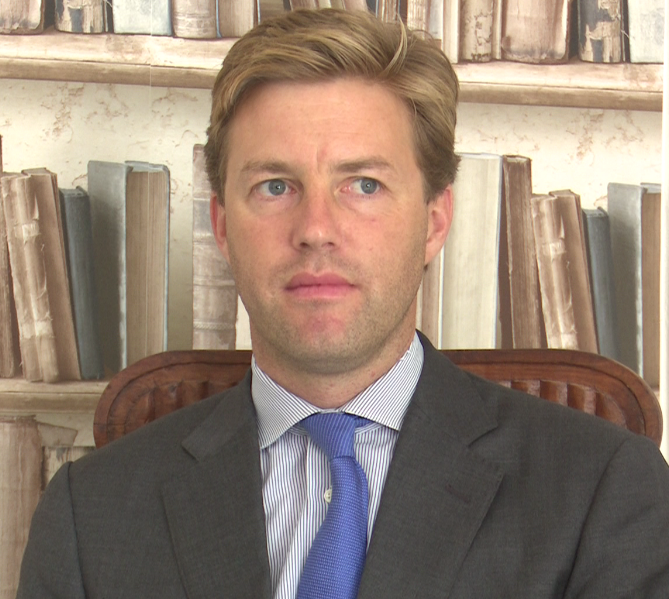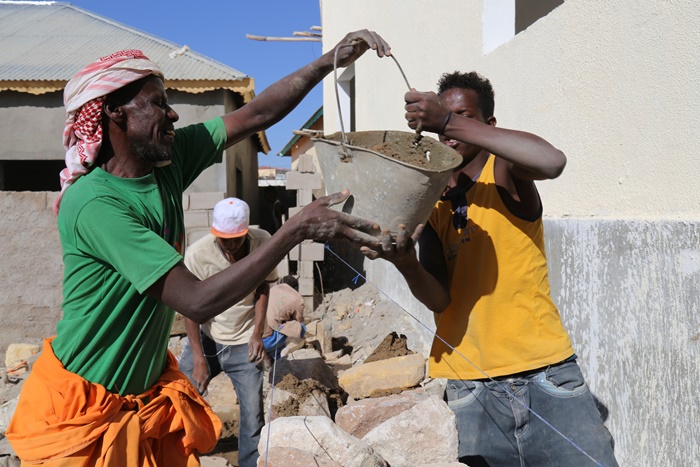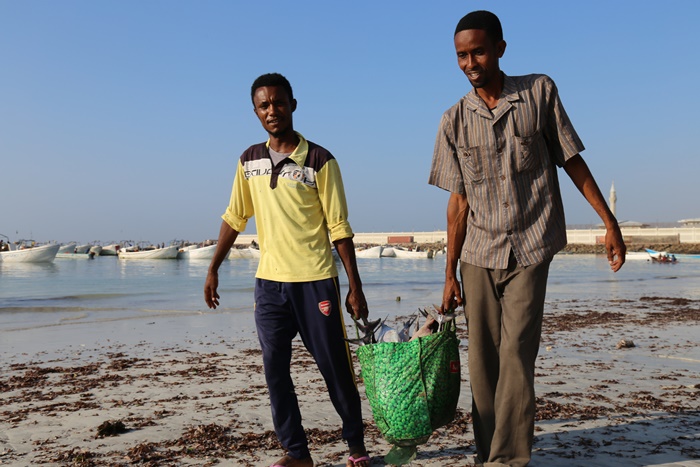Q&A: World Bank country representative on the Bank’s work in Somalia

THE WORLD BANK re-engaged with Somalia in 2013 after 22 years of being out of the country. Since then the Bank has engaged with Somalia on a range of areas in a bid to build the requisite institutional frameworks for Somalia’s recovery process.
Goobjoog News producers Simon Taveta and Mohamed Bishar had an exclusive with the World Bank Country Representative for Somalia Hugh Riddell on the sidelines of the just concluded Mogadishu Conference for in-depth insight on the Bank’s working in Somalia and the country’s recovery efforts.
Goobjoog News: Briefly explain the activities and the type of engagement the World Bank has in Somalia
Hugh Riddell: World Bank re-engaged with Somalia after 22 years of being out of the country in 2013.Since 1991, we had no program, no financing and we had no relationship with the government. But in 2013 we were able to re-engage and we are very pleased.
We work with the government, we help the government to deliver strong institutions, Two, we are enabling environment for business to get the jobs back for young Somali people and three we are working on resilience
How is the World Bank engaging with the Somali Government?
Somali government is a member of the World Bank. That means Somali Minister of Finance actually sits as a Governor on the board of the World Bank and wherever we work in the world the Bank actually works directly with the client Government.
So in Somalia the Bank is using its funding to go through Somalia institutions; that means we sign legal agreements with the Government of Somalia and the ministry of finance and the funds are actually passing directly through the Central Bank of Somalia, in addition the World Bank funding is going not only to Mogadishu but from Mogadishu to the Federal Member States including Kismayo, Jubbaland, Baidoa, Southwest and now increasingly Galmudug and HirShabelle. Also we are very engaged in Puntland and Somaliland where we work with the government as well.
How does the Bank align its support with national policies and other development actors in Somalia?
Policies are critical for Somalia at this point in time. Institutional development means policy reform and one thing Somalia has had a lot of issues with, in the last 20 years is corruption. That corruption is there because of weak institutions, so we are working with Somalia institutions to improve the policies and to implement the policies on governance reforms that means transparence, that means accountability
We are also supporting the National Development Plan. National Development Plan is the first plan that Somalia government has signed for 20 plus years and this plan is comprehensive but it is also pragmatic and focused and its going to be how we work with the government, we are going to align our plans directly through the National Development Plan.
How do you ensure that Bank activities are sustainable and country-owned?

Sustainability in Somalia means the government of Somalia needs to generate its own revenue so when we put funding into the government budget, we are matching government own revenue and it’s important that the government continues to increase revenue generation.
That means sustainability for the whole Somali authorities not just in Mogadishu but in Jubbaland and it’s very important they are building a police force in Jubbaland, in South West it’s important in Galmudug, it’s important in Puntland for sustainability.
We are seeing real improvement here. For example in Jubbaland two years ago they had $3 million of revenue and it’s growing now to $18 million. In the Federal government in Mogadishu 2012, the revenues were $35 million. This year 2017, the government is looking to mobilize $137 million, so we are seeing a great increase in sustainability of the Somali government itself.
In addition sustainability means using country systems. This means Somalia institutions and Somali people are leading all of the World Bank programming. If we do not use country systems we will not have sustainability in Somalia so it’s very important that all of the World Bank funding is using country systems in order so that when we go away the Somalis will be able to continue this work for themselves.
How do you ensure that the World Bank and other actors (such as UN and AfDB) don’t overlap in your support?
The World Bank Multi- Partner Fund is part of the STRF system (Somalia Development and Reconstruction Facility) which is chaired by the deputy Prime Minister and includes important cabinet members of the Federal government and the ministers of planning from the Federal Member States. So our funding through the Multi-Partner Fund is being channeled through the STRF system and also the UN Agencies and the AFDB are part of the STRF. So together we are working in co-ordination and also in alignment with the Somalia Authorities’ National Development Plan.
What are the main challenges for your work in Somalia?
Challenge number one is security. If there is peace and stability throughout Somalia the World Bank program would be able to reach more parts of the country; we would be able to do more, we would also probably have offices inside the country. At the moment we are not able to open offices here so our first challenge is security. Security also increases the cost of doing business in Somalia for the government, for the contractor, for the private sector and also for the agencies like the World Bank.
“This Government took leadership and launched DINA (Drought Impact and Needs Assessment) What it does is that it looks at the cost and the losses of drought in Somalia”
Challenge number two is institutional capacity. This is still developing in Somalia, there are still a lot of weaknesses in Somali institutions. In fact that is one of the difficult challenges of working with Somali country system, everything we do takes little bit longer to do because it is the Somalia institutions of governance that are doing procurement of all of the work. They do the financial management of the work and they do the audit; it’s not the World Bank, our programs are led by the Somalia authorities, that means sometimes some programs take longer to do but we have patience, we have time. The key is that the Somalis have the lead of everything that the World Bank Multi- Partner Fund does.
One thing that we have developed this year is called RCRF surge support. Surge support means the World Bank Multi- Partner Fund has agreed with the ministry of finance to give additional funding into the budget. This means that this budget has more space to get the things that needs to be done; that means employment, some more civil works in Mogadishu and also in all of the Federal Member States but they only get this money if they are meeting certain benchmarks that we agree on with the government in advance.
The benchmarks include revenue mobilization, expenditure management and importantly inter-governmental harmonization of the fiscal situation. This surge support is working very well, we are very happy, the government is also pleased with how it is progressing and next year 2018 we’ve included a larger allocation of funding to the surge support for the Somali government.
What can we expect from the World Bank in the near future?
In 2018 our number one priority is to continue working on core country systems; the most important country system we are working to develop is revenue generation, increasing accountability of the Somali budget. For example this week the Finance Minister has the public consultation for the first time in Somalia on the National Budget. We will also be hoping to build the capacity of the Auditor General in Somalia to increase the accountability on several service reforms.

You will see led by the Prime Minister’s office a major HR audit of all Somali institutions across the government. Puntland has already done a HR audit but next year you will see the Federal government more active in HR audit. These are going to be a key development.
We are also going to be doing more on jobs next year; you will see the catalytic fund of the school program start to disburse to the winners of the grant competition, the Somali businesses, SME’s, this is how we create jobs and employment in Somalia, it’s not the big businesses; the big businesses are great, they are doing good work but we need many, many smaller enterprises who can employ in the urban areas and the rural areas.
We are talking about fishing, we are talking about agriculture, we are talking about renewable energy, we are talking about access to finance so we want to work with Somali businesses because there we find entrepreneurial spirit, we find lots of energy, new ideas, we find young people are starting lots of smaller businesses and that what’s is going to drive investment in this country and we will be working with them.
October to November 2017 Federal government and Federal Member States carried out a Drought Impact and Needs Assessment (DINA) with your support. What are your findings and the expected mitigation plan?
2017 Somalia experienced the worst drought since 2011/2012 drought. This Government took leadership and launched DINA (Drought Impact and Needs Assessment) what it does is that it looks at the cost and the losses of drought in Somalia ,this has never happened before; t’s the first time Somali Government has done a DINA exercise. This will look at the comprehensive damage and loss but also what are the needs that Somalia has, the needs to recover from this drought and (b) to build resilience back into Somalia and the reason this is important is because we know that it’s just a matter of time before Somalia has another drought.
And next time there may be no so much money. This year Somalia mobilized over a billion dollars to support humanitarian recovery, that’s a very generous contribution by the International community but it’s not guaranteed so next time, the Somalia Government needs to be responding. They need to have institutions in place to lead that response; again this is all about Somali leadership, this is about the DINA and it is not done by the World Bank or the UN.
“Today in Somalia all of the funding the Multi- Partner Fund is allocating and spending is controlled under the SFMIS (Somalia Financial Management Information System)”
We are helping, we are proving some expertise but it’s the Somali Government with the Federal Member States and the private sector who are looking at what the damage and loss was and what the needs are and that means that when it comes to actually responding they will also be in the lead not us. So I think it’s a good step forward we look forward to launching this with minister Jamal Hassan at Somali Partnership Forum as well as in February for the major launch.
Somali unemployment rate is sky rocketing and the most affected are the youth. What role is the World Bank playing in creating jobs to the youth of Somalia?
The World Bank can’t create jobs we are not an employer we don’t create jobs. What we can do in Somalia is help the Somalis themselves to generate jobs in two ways: One we create an enabling environment, what does that mean? It means getting all the laws in place that attract investment, that attract domestic businesses to start, that means making it simpler to start business, simpler to access money and simpler to employ people so that is the enabling environment.

Second thing we could do is actually work together with the Central Bank and the Financial institutions to build a healthy Somalia financial sector, its only the financial sector which is going to provide the resources the money, the loans, the equity so the SME’s can stir up business.
In addition another thing we are doing is, we are going to be working with the energy sector, when we talk to businesses in Somalia there are two key constraints apart from security that they have. One is access to finance number, two is the high cost of electricity. Now we know that Somalia has a lot of potential in renewable energy it has the longest coastline, it’s also the windiest coastline in Africa and the tremendous solar resource as well.
If we can bring down the prices of electricity in this country we’ll see a lot more startups by young people, a lot more job creation. So next year we will be hosting with the Somalia authorities Renewable Investor Conference to attract outside investors and also to demonstrate what the opportunities are to start up Renewable energy businesses in this country. So financial sector, renewable energy and we hope we will have a good way forward.
What is the relationship between Federal Government and Federal Member States in relation to the funds received from World Bank?
Remember that only four years ago there was only Somaliland, Puntland, South Central, now Somalia has Federal Member States within a Federation so this a very new context, a very new reality for Somalia. Other Federal Countries like Ethiopia ,UAE, Nigeria they have had many years of developing inter-governmental relationships between the capital and the regions so we are in a very early stage and I’m very impressed by what we are seeing already in Somalia.

We are using our money, the Multi- Partner Fund money to develop this inter-governmental relationships so on one hand we work with Mogadishu they are our legal clients but Mogadishu is working with all of the Federal Member States to channel resources for projects all for supporting administration in the areas now.
We have to hold account for the funds so we work with Mogadishu to set benchmarks and to set criteria, eligibility criteria for the funding and they then work with the regions to develop and extend those relationships in the regions.
So far we are seeing an excellent response and one very important thing, it is easy to get sidetracked by politics in Somali, there is a lot of politics but when we talk about technical issues like what is the role of Central Bank in channeling resources in the regions, what it the role of the Accountant General for making payments to the region, what it the role of the legislation in the regions, should there be one role or many roles?
“Next year we will be hosting with the Somalia authorities Renewable Energy Investor Conference to attract outside investors and also to demonstrate what the opportunities are to start up Renewable energy businesses in this country”
This is where Somalis come together and we have a technical conversation, so the Multi-Partner Fund is a way of bringing Somali stakeholders together and having a rational technical conversation about substance on financial management issues, public finance management issues, policy issues and we will continue to do that because this is going to take many years before Mogadishu and the regions have a natural working relationship
Briefly tell us about disbursement of funds. How does the World Bank ensure that the funds go into the intended purpose and into the right pockets?
Today in Somalia all of the funding the Multi- Partner Fund is allocating and spending is controlled under the SFMIS (Somalia Financial Management Information System). The SFMIS is a new technology; it’s a new software which was installed by the government about two years ago and it went live about the same time; this means that all of the expenditure under the government has automated tracking.
Every dollar that is spent is tracked, this for the first time we see where the funds are going that gives us confidence that when we put funds in through the Somalia authorities we can see who is getting it, we have a responsibility as the World Bank to oversee 100% of the funding that we have in the country a responsibility to ourselves, responsibility to the Somali people and a responsibility to the donors.